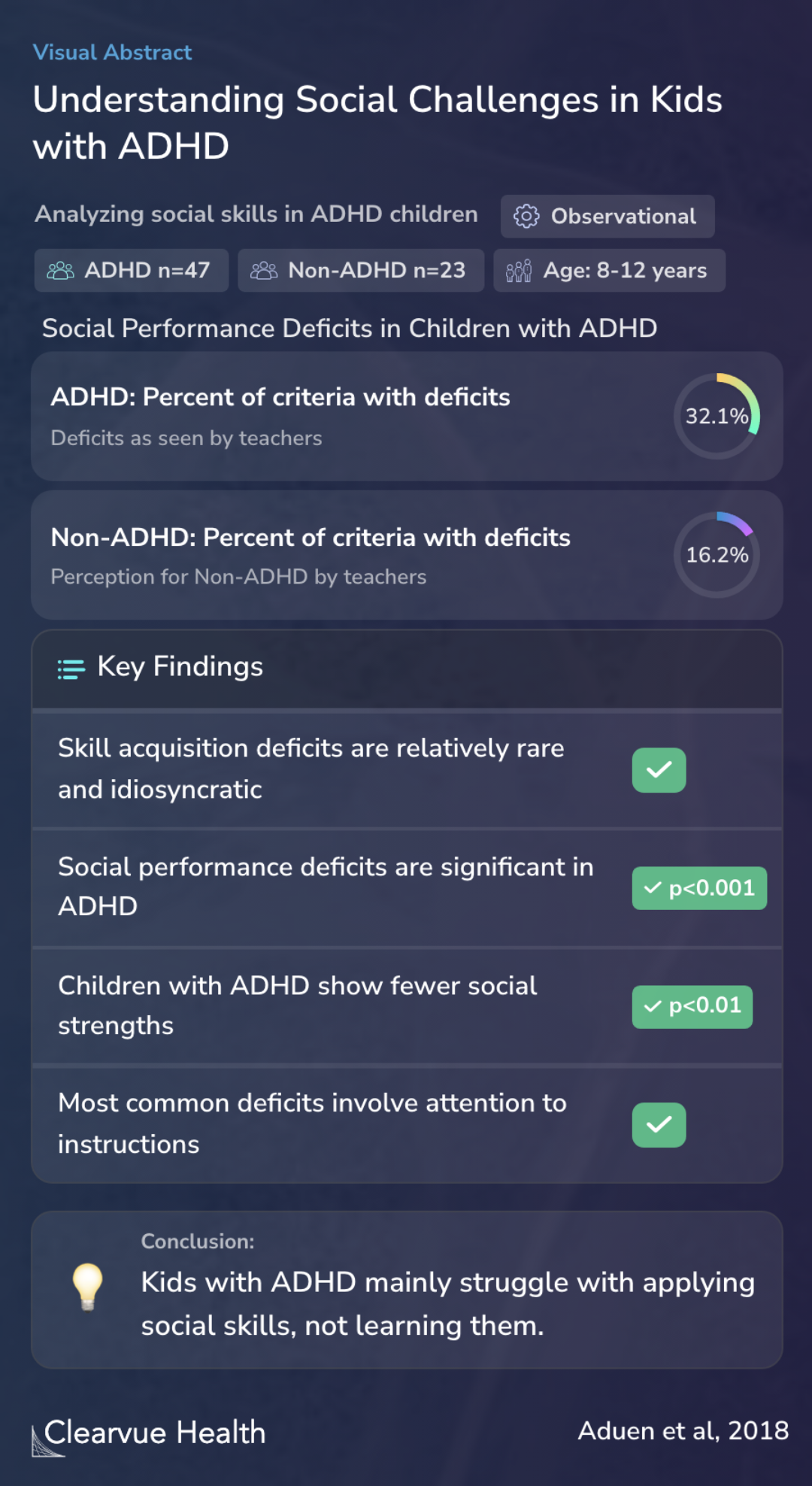Social Problems in ADHD: Is it a Skills Acquisition or Performance Problem?
Understanding Social Challenges in Kids with ADHD
Aduen PA, Day TN, Kofler MJ, Harmon SL, Wells EL, Sarver DE

Objectives
This article aims to summarize insights from a recent study on why children with ADHD might not benefit much from social skills training. It appears the issue isn't that these kids don't know how to behave in social settings; instead, they struggle to use the skills they have consistently. This distinction is vital, as past efforts might have targeted the wrong problem area, assuming these children needed to learn social skills from scratch.
Recent models suggest that social skills training's inefficacy for children with ADHD may be due to target misspecification, such that their social problems reflect inconsistent performance rather than knowledge/skill gaps. No study to date, however, has disentangled social skills acquis...
Methods
The study took a close look at children aged between 8 to 12 years, some with ADHD and some without. They observed and measured how these children behave socially, trying to pinpoint exactly where the challenges lie.
Children ages 8-12 with ADHD (n=47) and without ADHD (n=23) were assessed using the well-validated social behavioral analysis framework to quantify cross-informant social skills acquisition deficits, performance deficits, and strengths.
Results
When it comes to how children with ADHD behave with others, the study found some significant challenges. Both parents and teachers noticed these kids often struggle more than their peers without ADHD when it comes to interacting socially. But it's not all bad news; the children do have social strengths, though not as pronounced as those without ADHD. Interestingly, the study suggests that the main issue isn't about learning social skills but rather about applying them consistently in daily interactions.
Results provided support for the construct and predictive validities of this Social Skills Improvement System (SSIS) alternate scoring method, including expected magnitude and valence relations with BASC-2 social skills and ADHD symptoms based on both parent and teacher report. Acquisiti...
Conclusions
This study sheds light on a crucial aspect: children with ADHD mainly find it challenging to apply social skills they already know rather than learning new ones. This insight is vital for designing more effective ways to help these kids navigate social situations better. The paper ties into broader research, suggesting a need to rethink how we support children with ADHD in social settings, focusing more on application rather than acquisition of social skills.
These findings are consistent with recent conceptualizations suggesting that social problems in ADHD primarily reflect inconsistent performance rather than a lack of social knowledge/skills. Implications for refining social skills interventions for ADHD are discussed.
Key Takeaways
Context
Medications might play a role in helping children with ADHD improve their social interactions. A study by Abikoff and colleagues in 2004 explored this, finding that adding social skills training to medication didn't significantly change the social skills of children with ADHD. This suggests that medication alone might be a critical factor in helping these children socially.
Moreover, language abilities might also influence social challenges in children with ADHD. Staikova and her team in 2013 delved into this, discovering that children with ADHD often struggle with using language in social contexts, even if their basic language skills are intact. This highlights that part of the social difficulties faced by children with ADHD could stem from issues with language in social interactions.